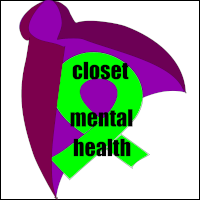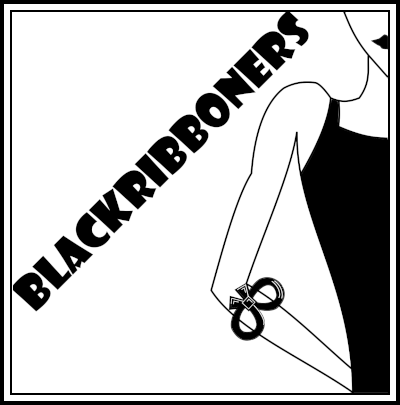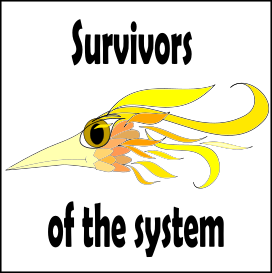 CLOSETED MENTAL HEALTH
CLOSETED MENTAL HEALTH

 CLOSETED MENTAL HEALTH
CLOSETED MENTAL HEALTH

Our own feedback and surveys to date indicate that there are *three great directions* beyond what we currently provide badges and specific awareness pages for.
i) The first is a stratification of Mental Health issues by practical stigmas of the life-crippling variety.
So for instance, if one is Out about having Schizophrenia, Bipolar or Borderline Personality Disorder, then virtually no employer in the current world will ever hire you.
In fact, it would appear that from Borderline upwards, virtually no medical profession individual in this country is even willing to pronounce a diagnostic of the condition.
They may be viewing pronouncing that as a career risk and/or as the effective destruction of the patient's life.
Some people who are Out about e.g. having OCD (Obsessive-Compulsive) have known to be subjected to vigilante attacks by thugs falsely claiming that the person is a paedophile.
(Nor is it solely Mental Health people who are targetted in such a manner by thugs and ostracizers and 'social cleansers'. Some decades ago, such thugs felt they could get away with targetting LBGT people in the same manner. Those now being legally protected, some such thugs' attention has turned instead to people with OCD and to Pan people :|)
So some examples of people and/or adversities faced that you may not have seen or considered at all are Students Closeted about having, or thinking they have, such as Bipolar or Schizophrenia. Who aren't willing for this info to ever find its way into the hands of their college or (any prospective) employer.
Upon winning the Lent 2019 Scavenger Hunt, the BlackRibboners team,

standing for Closet Mental Health, declared:
"It's time the Students of Cambridge cottoned on to how "Remus Lupin" is the actual reality of
attempting a
teaching career
while having Schizophrenia, being Bipolar, or various other conditions.
Why the lack of investigations into this, and of protests about this?"
The following groups will be presenting extra examples and comments here during the 2019-2020 academic year:

ii) The second Great Axis of the Currently Unrecognized is General Dysphoria.
Gender Dysphoria is by now well-acknowledged, while essentially no understanding for, compassion for, or welfare resources for, other types of Dysphoria exist.
An example of Dysphoria that is not the more familiar Gender Dysphoria is Age Dysphoria. Some further issues with this are as follows.
- The Ratio Problem: it is very hard in some ways to be intellectually 40 and emotionally sixteen (whatever figure between these numbers one's biological age is).
- Other cases involve a different trauma or development. Some 'had to grow up' at the moment of being orphaned or of a dear parent becoming terminally ill, and this may have accelerated their age or split their age. These people have a lot of issues that, with all due respect, you're probably not aware of.
- As regards how ageist bullying is around as dangerous to people with Age Dysphoria as transphobic bullying is to Trans* people (for whom dangerous here quite explicitly includes that 40% are at some point suicidal). Let's consider what a person feels like in third year when all their third year friends have abandoned them for still 'acting like a Fresher'. Moreover some people with Age Dysphoria don't consent to being aged by such as featuring on Class Lists, or employment forms having date of birth as a compulsory box to fill in, under "certification that all info provided is correct".
Our final point is that plenty of people don't Consent to their Dysphoria being classed as 'a Mental Health condition'. C.f. how homosexuality used to be 'classified' as a such, with some people even subjected to 'corrective therapy' for it against their will.
As to Dysphoria not being morally such a thing either in the opinion of plenty of people experiencing it, this quite clearly isn't just the feeling of some empowered Trans groups in the regard of Gender Dysphoria. It applies as well to those who experience other kinds of Dysphoria as well, such as Age Dysphoria.
While Gender Dysphoria appears to be more common than other Dysphorias, there are many other Dysphorias (whether or not recognized by the gatekeeper medical profession). It remains plausible that some such's frequency is masked by the combination of being even more stigmatized and having no 'legally protected status'.
iii)The third Great Axis is General Fluidity This axis is however mostly significant because many Fluid people are or have been bullied, including by people elsewise similar to them who however aren't, or didn't acknowledge, Fluidity.
For instance, until around 2014, GenderFluid people were bullied by a significant fraction of other Trans people.
Also Switches - a type of KinkFluid people - were bullied in the older generations of Kink culture (especially those formed in the 89s or 90s or previously).
This being somewhat off-topic for Closet Mental Health, we refer you to the above link for more.